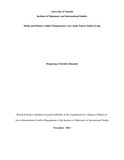| dc.description.abstract | The growth of Information and Communication Technologies (ICTs) has led to rising worldwide
connectivity and both states and societies are being impacted by these changes. Mobile phones
and Internet have provided many new possibilities and media for communication. This paper
highlights the impacts of ICTs on conflict management, although it mainly focuses on the Media
and Ethnic Conflict Management with case study of Nation Media Group. With the coming of
the fiber optic and the increase with the number of people with mobile phones,
communication has become more effective despite the good that comes with increased
platforms of communication and interaction, the society has made this a battle field, with
criminals using this platform to create war among the communities. This therefore is a great
challenge in conflict management because this is a virtual platform where it would be
difficult to bring the culprits to book. The objective of this study is to assess the Media and
Ethnic Conflict Management by looking at various ways through which the media have
been abused which include; through blog sites , hate speech messages and incitement. The
primordialist theory indicates that the starting point of technological development, changes
and innovation is always people. Proponents of primordialist accounts of ethnic conflict argue
that ethnic groups and nationalities exist because there are traditions of belief and action towards
primordial objects. This theory provides a way to assess the organization or community
readiness for technological innovation. The study used a descriptive design approach. The target
population in this study is Nation Media group departments. The researcher used a stratified
sampling approach to cover the total population and examined a sample of 47, which is 60% of
whole population. The data collection instrument used was self- administered questionnaire. The
data collected was presented in tables and graphs. The findings indicated that 66.6 % of the
respondents trust blogs sites , 68.2% of the respondents felt that hate speech is wide spread
among Kenyans and 68.1% of the respondents indicate that incitement is rampant in the
media fraternity which therefore affect conflict management. The researcher recommends that
the young generation benefited a lot from the use of ICTs with an increasing access to
information, freedom of expression and dissemination of information. At the same time ICTs can
contributed to the promotion of peace, being the most obvious instrument among people using it
on a daily basis. Greater and closer attention needs to be paid to the new media in order to
regulate how private companies could work together taking the states responsibility and
legitimate regulation of new media into account. There should be an increased focus on ensuring
peace and security to states. Basically, governments should identify strategies to engage with
private companies through opportunities such as consultative workshops to which commercial
actors can actively participate that would help to develop an ethical framework, which could be
used to guide the commercial media sector in their work. In order to appropriately prevent the
negative impact of ICTs and social media, such ethical framework is needed for a responsible
use of new media and to regulate the content of social media. | en |

